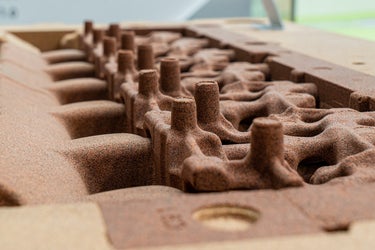CNC machining is often the easiest, go-to manufacturing technique when designing mechanical parts. However, as production scales up, the extended cycle times and high scrap rates associated with CNC machining can become challenging. If you're currently machining parts from solid blocks of metal, here are some alternative manufacturing processes to consider:


Die Casting
Die Casting is a widely used process for mass production. High-pressure die casting can achieve exceptionally short cycle times of just seconds to minutes, resulting in high output rates and low piece prices. However, die casting is primarily suitable for materials with low melting points, such as Aluminum and Zinc. Another drawback of die casting is the high initial tooling cost, which makes it less flexible for design changes.

Sand casting
Sand casting offers a more accessible alternative compared to die casting. The required investments for tooling and machines are typically lower, albeit with the trade-off of longer cycle times. Due to the sand mold and unpressurized injection, surfaces produced through sand casting tend to be rougher, therefore additional machining or polishing is often required. An advantage of sand casting is its versatility, as it can be used with a wide range of metals.
Forging
Forging is a manufacturing process that involves shaping metal by applying compressive force through controlled impacts or continuous pressing. It's particularly well-suited for producing strong, durable parts with excellent mechanical properties. Forging can be used with a variety of metals, including steel, aluminum, and titanium. Forging near-shaped parts, combined with machining of surfaces & small features often saves costs of production & material scrap. While forging can be more expensive upfront due to tooling and setup costs, it can be highly efficient in terms of material utilization and production speed. By carefully selecting the forged shape, small design changes can easily be implemented.

3D Printing
Additive manufacturing, or 3D printing, has gained significant popularity for producing complex parts with intricate geometries. It offers design freedom, reduces material waste, and can be cost-effective for low-volume production. Various metal 3D printing techniques allow for the creation of metal parts with high precision and tailored properties. 3D printing can be expensive for high volume parts because of its long cycle times. It's flexibilty to design changes and broad range of supported materials make it a particularly useful process when customization or rapid prototyping is required.
Metal Injection Molding
Metal injection molding is a versatile process that combines aspects of plastic injection molding and powder metallurgy. It's suitable for producing small to medium-sized metal parts with complex shapes and tight tolerances. MIM is often used for materials like stainless steel, titanium, and tungsten alloys. MIM is cost-effective for high-volume production runs but tooling costs can be relatively high. Therefore this process is less flexible for design changes.
Investment Casting
Investment casting, also known as lost-wax casting, is a precision manufacturing method where a ceramic mold is created from a wax pattern which is melted away after each use. It's ideal for producing intricate and high-quality metal components with fine surface finishes. Investment casting can be used with a wide range of metals, including aluminum, bronze, and various alloys. The low mold costs make this process suitable for design changes and very high quality & surface finish can be achieved. Because of long cycle times, it can be expesive for higher volumes.

How Value Engineering can help...
Each process has it's own desinct advantages and limitations. Which process is the best fit for your design is a balance of many factors such as materials, production volumes and specific requirements. As a boutique value engineering and manufacturing engineering company, Manuformance specializes in helping businesses optimize their manufacturing processes. Our expertise in process selection, design optimization and cost-effective manufacturing solutions can assist you in achieving high-quality results while minimizing cycle times and scrap rates. Contact us today to explore the best manufacturing options tailored to your unique design & requirements.


